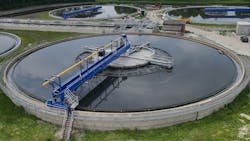Mass. announces $1.3B for wastewater, drinking water infrastructure
Massachusetts officials announced that 183 drinking water and wastewater projects across the state are eligible to receive approximately $1.3 billion.
The funds include low-interest-rate loans and grants to fund construction, planning, and asset management projects designed to improve water quality, upgrade or replace aging drinking water and wastewater infrastructure, and cut treatment plant energy use and costs.
These offerings include nearly $189 million in additional funding that Massachusetts expects to receive from federal Bipartisan Infrastructure Law (BIL) and $100 million from American Rescue Plan Act (ARPA) funds this year.
“Wastewater and drinking water facilities play a crucial role in protecting our environment and the public health, and this financing supports the efforts of our cities and towns to make upgrades and modernize this vital water infrastructure,” said Governor Charlie Baker. “The Baker-Polito Administration has made it a priority to invest in our critical infrastructure, including proposed two rounds of ARPA funding, to fund important projects. These projects will increase the availability of safe, clean, and reliable water resources across the Commonwealth for many years to come.”
“Our communities deserve wastewater and drinking water infrastructure that fully serves their needs, protects their residents from harm, and preserves our natural resources,” said Lieutenant Governor Karyn Polito. “Additionally, this State Revolving Fund financing will help stimulate local economies by building new treatment facilities and replacing outdated waterlines.”
Funding Breakdown
The projects include 88 clean water projects totaling approximately $963 million and 61 drinking water projects totaling approximately $363 million. An additional $3.7 million will be offered by the Trust as grants for 34 Asset Management Planning projects.
“The State Revolving Fund (SRF) loan program assists communities and water utilities by updating their water infrastructure, investing in energy efficiency and renewable energy at treatment facilities, and addressing the problem of emerging contaminants in our drinking water,” said Energy and Environmental Affairs Secretary Beth Card. “These efforts make the delivery of local water resources more sustainable, reliable, and affordable.”
17 of the water infrastructure projects receiving financing are for renewable energy, energy efficiency, or green infrastructure initiatives. Energy use at wastewater and drinking water treatment facilities is a major contributor to overall energy consumption for many cities and towns, with communities statewide spending approximately $150 million per year on electricity to treat 662 billion gallons of wastewater and drinking water. About 30 percent of municipal energy use derives from water treatment.
“Treatment facilities and water infrastructure are important to the quality of life in our communities,” said MassDEP Commissioner Martin Suuberg. “When we upgrade treatment plant equipment and processes or install renewable technologies, these facilities become more energy efficient, reduce air emissions, save communities money, and, ultimately, better protect our natural resources.
This year, 90 of the new projects are eligible to receive principal forgiveness. Principal forgiveness is awarded to renewable energy projects and for projects in communities that meet the affordability criteria established by the Clean Water Trust. The affordability criteria factors in per capita income, unemployment rate, and population trends.
The Commonwealth has also offered to reduce the SRF borrowing rate from 2 percent to 1.5 percent for communities that support the Housing Choice Initiative. Twenty-eight applicants have the Housing Choice designation.
SRF Breakdown
This year, the Clean Water SRF provides $963 million in financing for clean water projects across the Commonwealth. Approximately $898 million will finance 67 new construction projects, $41 million will be allocated towards financing four previously approved multi-year projects, $3 million has been allocated to the emergency set-aside account, $5 million will be directed to the Community Septic Management Program to remediate failed septic systems in participating communities, and $15 million will finance 17 proposed planning projects.
This year, the Drinking Water SRF provides $363 million in financing for drinking water projects across the Commonwealth. Approximately $319 million will finance 43 new construction projects, approximately $29 million will be allocated towards financing six previously approved multi-year projects, $5 million will fund an emergency set-aside account, and nearly $10 million is allocated for financing 12 planning projects.
An additional $3.7 million will be offered by the Trust as grants for 34 Asset Management Planning projects, with 27 communities qualifying with Clean Water projects and seven communities qualifying with Drinking Water projects.
The next SRF project solicitation for proposals to be considered for the 2023 intended use plan will open by MassDEP no later than July 1, 2022.
